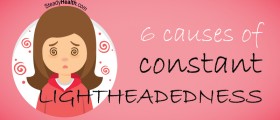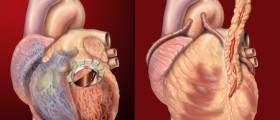Dizziness in Women
The most frequent cause of dizziness is stress. This is because stress causes a short and shallow breathing. This method of breathing does not bring enough blood to the brain and other body parts. In addition to feeling dizzy, a woman can feel stiffness in the fingers and toes.

Causes of Dizziness in Women
Feeling of vertigo and feeling a little wobbly in the legs may occur as a habit of women to skip meals, or not eating at all because the day was so intense and she had a lot of obligations to finish. Due to this, the drop in blood sugar level occurs, as well as the sense of dizziness. The best way to avoid low blood sugar level is a good and healthy diet. Therefore, meals rich in carbohydrates and protein can be helpful. In some people, more time is necessary for the arrival of the blood to the brain during sudden getting up. Because of that, they may feel a little bit dizzy and also may experience darkening of vision.
People with lower blood pressure are at great risk to experience dizziness. Also, the cause of dizziness may be even dehydration. Women often feel dizzy at times before the monthly cycle, the pregnancy and around menopause. Some experts believe that, the cause of dizziness in these cases is the sensitive middle ear, which is susceptible to loss and flow of estrogen. Therefore, the hormonal changes lead to dizziness in women. Also, one of the causes of dizziness in women is anemia, and even 20% of women suffer from it. Anemia is marked by the decrease of hemoglobin, or reduced levels of iron in the body. In this case, blood cannot transmit enough oxygen to the brain, which is why people feel dizzy. In some cases, women who suffer from migraine headaches can feel dizzy, too.
- The percentage of women who suffered from dizziness once a week or more frequently was 35.7%.
- Compared to the women without dizziness, those with the symptom were younger; had a higher body weight, body mass index, body fat percentage, muscle mass, and waist-to-hip ratio; had higher systolic pressure; were slower in reaction time; had higher physical and psychological symptom scores of menopause; exercised less regularly; and consumed less alcohol.
- A multivariate logistic regression analysis revealed that the anxiety symptom, which was evaluated by the Hospital Anxiety and Depression Scale, was the sole factor that was independently associated with dizziness.
Inner Ear Role in Feeling Dizzy
When a woman has certain disease of the thyroid gland, it can lead to weight loss or weight gain, and even depression. The inner ear is particularly sensitive to changes in the work of thyroid gland, which can cause dizziness. Almost the majority of drugs have some side effects, and most women who take certain medications can feel dizziness as a side effect of the drug they use. Some people may feel dizzy in the crowd, as is the case in a car crowd, in a restaurant, store or shopping mall, where there are large numbers of people. If the vertigo in this case occurs, it is most often due to feelings of panic.








-In-Adults_f_280x120.jpg)








Your thoughts on this
Loading...